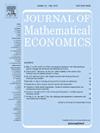Signaling in dynamic contests with heterogeneous rivals
IF 0.7
4区 经济学
Q3 ECONOMICS
引用次数: 0
Abstract
We study signaling in dynamic contests where a privately informed challenger faces multiple rivals. When the challenger can choose between simultaneous and sequential contests, the optimal choice hinges on the degree of player heterogeneity. This is because the strength of future opponents affects the incentive to signal, whereas the strength of current opponents affects the extent and cost of signaling. We show that against homogeneous rivals, the challenger may prefer to reveal information through sequential contests. However, against heterogeneous opponents, the challenger prefers simultaneous contests to avoid information revelation. Additionally, in sequential contests with heterogeneous rivals, we characterize the equilibrium choice of rivals’ order (e.g., weak first and strong second) and show that only pooling and partial-pooling equilibria emerge.
与异质对手动态竞争中的信号
我们研究动态竞赛中的信号,其中一个私下知情的挑战者面对多个对手。当挑战者可以在同时竞争和顺序竞争中做出选择时,最优选择取决于玩家的异质性程度。这是因为未来对手的实力会影响发信号的动机,而当前对手的实力会影响发信号的程度和成本。我们发现,面对同质竞争对手,挑战者可能更倾向于通过顺序竞争来揭示信息。然而,面对异质对手,挑战者倾向于同时竞争,以避免信息泄露。此外,在与异质竞争对手的连续竞争中,我们描述了竞争对手顺序的均衡选择(例如,弱第一和强第二),并表明只有池化和部分池化均衡出现。
本文章由计算机程序翻译,如有差异,请以英文原文为准。
求助全文
约1分钟内获得全文
求助全文
来源期刊

Journal of Mathematical Economics
管理科学-数学跨学科应用
CiteScore
1.70
自引率
7.70%
发文量
73
审稿时长
12.5 weeks
期刊介绍:
The primary objective of the Journal is to provide a forum for work in economic theory which expresses economic ideas using formal mathematical reasoning. For work to add to this primary objective, it is not sufficient that the mathematical reasoning be new and correct. The work must have real economic content. The economic ideas must be interesting and important. These ideas may pertain to any field of economics or any school of economic thought.
 求助内容:
求助内容: 应助结果提醒方式:
应助结果提醒方式:


